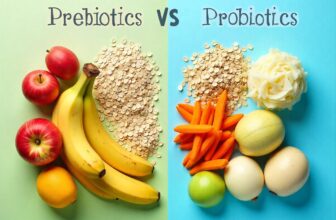
Is your gut trying to tell you something? With over 70% of your immune system residing in your digestive tract, maintaining optimal gut health isn’t just about avoiding stomach discomfort – it’s about your overall wellbeing. 🦠
Yet in our modern world of processed foods and stressful lifestyles, achieving perfect gut health can feel like solving a complex puzzle. While probiotics often steal the spotlight, vitamins play an equally crucial role in maintaining your digestive harmony. From boosting beneficial bacteria to strengthening your intestinal barrier, the right vitamins can transform your gut health from problematic to pristine. ✨
Let’s explore the essential vitamins that can revolutionize your gut health, starting with the basics of digestive wellness and diving deep into specific nutrients that make the biggest impact. Whether you’re dealing with occasional bloating or chronic digestive issues, understanding these vital nutrients could be your key to better gut health.
Understanding Gut Health Basics
Your gut health directly influences your overall well-being, acting as a central hub for nutrient absorption and immune function. Vitamins play a crucial role in maintaining digestive wellness by supporting enzyme production, protecting gut lining, and fostering beneficial bacteria growth.
Common signs of poor gut health include:
- Bloating and gas
- Irregular bowel movements
- Food sensitivities
- Fatigue
- Skin issues
| Vitamin Type | Impact on Gut Health |
|---|---|
| B Complex | Aids digestion |
| Vitamin D | Supports immunity |
| Vitamin C | Repairs tissue |
| Vitamin A | Maintains barriers |
Essential B Vitamins for Gut Health
B vitamins play a crucial role in maintaining optimal gut health through various mechanisms. B12 enhances nutrient absorption in the intestines, while B7 (Biotin) supports the growth of beneficial gut bacteria. B3, also known as niacin, aids in producing digestive enzymes essential for breaking down food efficiently.
Here are the best natural sources of B vitamins for gut health:
- Eggs and dairy (B12)
- Nuts and legumes (B7)
- Fish and poultry (B3)
- Leafy greens (B-complex)
| B Vitamin | Main Function | Food Sources |
|---|---|---|
| B12 | Nutrient absorption | Eggs, dairy |
| B7 | Bacterial growth | Nuts, legumes |
| B3 | Enzyme production | Fish, poultry |
Vitamin D’s Impact on Gut Flora
Vitamin D plays a crucial role in maintaining gut health by supporting beneficial bacteria and strengthening the intestinal barrier. This essential nutrient acts as a powerful modulator of the immune system, helping to balance the gut microbiome and reduce harmful inflammation. Studies show that adequate vitamin D levels can significantly improve digestive health and overall immune function.
Key Benefits of Vitamin D for Gut Health:
- Strengthens intestinal barrier
- Promotes beneficial bacteria growth
- Reduces inflammatory response
- Supports immune system balance
| Daily Vitamin D Requirements |
|---|
| Adults: 600-800 IU/day |
| Seniors: 800-1000 IU/day |
| With deficiency: 1000-4000 IU/day |
Power of Vitamin C
Healing gut lining & Antioxidant benefits
Vitamin C plays a crucial role in gut health by promoting collagen synthesis, essential for maintaining a strong intestinal barrier. As a powerful antioxidant, it protects gut cells from oxidative stress and inflammation, supporting overall digestive wellness. This vital nutrient also enhances the absorption of iron and supports immune function within the gut.
Natural food sources & Supplement guidelines
- Citrus fruits (oranges, lemons)
- Bell peppers
- Strawberries
- Broccoli
- Kiwi
| Supplement Form | Daily Dosage |
|---|---|
| Ascorbic acid | 500-1000mg |
| Liposomal C | 1000-2000mg |
Daily intake from whole foods is ideal, but supplementation may benefit those with gut issues. Natural sources provide additional fiber and nutrients that support optimal absorption.
Other Beneficial Vitamins
Vitamin A plays a crucial role in maintaining the gut barrier function by supporting the production of mucus and promoting the growth of beneficial gut bacteria. Additionally, it helps repair and regenerate the intestinal wall, preventing harmful substances from entering the bloodstream.
Vitamin K2 and E work together to enhance gut immunity and provide antioxidant protection. While K2 helps regulate gut flora and supports immune cell production, vitamin E protects gut cells from oxidative stress and inflammation, creating a healthier digestive environment.
- Key benefits:
- Vitamin A: Barrier function & mucus production
- Vitamin K2: Immune regulation & gut flora balance
- Vitamin E: Antioxidant protection & inflammation reduction
| Vitamin | Primary Function | Daily Requirement |
|---|---|---|
| A | Gut barrier support | 700-900 mcg |
| K2 | Immune regulation | 90-120 mcg |
| E | Antioxidant protection | 15 mg |
Implementing Vitamin Strategy
Best Absorption Times and Combining Vitamins
Take fat-soluble vitamins (A, D, E, K) with meals containing healthy fats for optimal absorption. Water-soluble vitamins (B, C) are best absorbed on an empty stomach. Combine vitamin D with magnesium to enhance effectiveness, and pair vitamin C with iron supplements to boost absorption.
Tracking Improvements and Interactions
Monitor your gut health progress through a symptom diary, noting digestive changes and energy levels. Be cautious of vitamin D interfering with blood pressure medications and vitamin C affecting blood sugar readings. Start with one supplement at a time to identify individual effects and potential sensitivities.
| Vitamin Type | Best Time to Take | Recommended Combinations |
|---|---|---|
| Fat-soluble | With meals | Healthy fats |
| Water-soluble | Empty stomach | Iron (with Vitamin C) |
Taking care of your gut health requires a thoughtful approach to vitamin supplementation. B vitamins, particularly B12 and B7, support digestive function and nutrient absorption, while vitamin D plays a crucial role in maintaining a balanced gut microbiome. Vitamin C’s antioxidant properties help protect the gut lining and promote overall digestive wellness.
Creating a comprehensive vitamin strategy is key to achieving optimal gut health. Start by incorporating vitamin-rich foods into your daily diet and consult with a healthcare provider about appropriate supplementation. Remember that consistency and a balanced approach will yield the best results for your digestive well-being.






